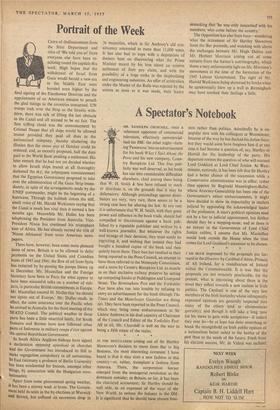A Spectator's Notebook
MR. RANDOLPH CHURCHILL, once a vehement opponent of commercial television, effectively commercial- ised the BBC the other night—turn- ing 'Panorama' into an advertisement for his book What I Said About the Press and his new company, Coun- try Bumpkins Ltd. This free pub- licity was well deserved, as his book has run into considerable difficulties elsewhere, chief among them being that W. H. Smith & Son have refused to stock or distribute it, on the grounds that it may be defamatory. Although proceedings against distri- butors are very, very rare, there seems to be a strong case here for altering the law. At any rate it is unfortunate that W. H. Smith, with their great power and influence in the book trade, should feel compelled to discriminate against a book pub- lished by a reputable publisher and written by a well-known journalist. But whatever the rights and wrongs of their decision, they must surely be regretting it, and wishing that instead they had bought a hundred copies of the book and then quietly burnt them. Their ban has resulted in their being reported to the Press Council, an attempt to have them referred to the Monopoly Commission, and a move by Country Bumpkins Ltd. to muscle in on their exclusive railway preserve by setting up competing kiosks at Paddington and Liverpool Street. The Birmingham Post and the Yorkshire Post have also run into trouble by refusing to carry an advertisement for the book (though The Times and the Manchester Guardian are doing so). They have been reported to the Press Council, which may bring some embarrassment to Sir Linton Andrews in his dual capacity of Chairman of the Council and Editor of the Yorkshire Post. All in all, Mr. Churchill is well on the way to being a fifth estate of the realm.


































 Previous page
Previous page